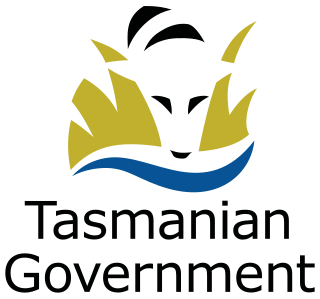Related Research Articles

Infrastructure is the set of facilities and systems that serve a country, city, or other area, and encompasses the services and facilities necessary for its economy, households and firms to function. Infrastructure is composed of public and private physical structures such as roads, railways, bridges, tunnels, water supply, sewers, electrical grids, and telecommunications. In general, infrastructure has been defined as "the physical components of interrelated systems providing commodities and services essential to enable, sustain, or enhance societal living conditions" and maintain the surrounding environment.

The Tasmanian Government or the Government of Tasmania is the executive branch of the Australian state of Tasmania. The leader of the party or coalition with the confidence of the House of Assembly, the lower house of the Parliament of Tasmania, is invited by the governor of Tasmania to form the executive. The governor appoints the premier of Tasmania.
The Deutsche Gesellschaft für Internationale Zusammenarbeit (GIZ) GmbH, often simply shortened to GIZ, is the main German development agency. It is headquartered in Bonn and Eschborn and provides services in the field of international development cooperation and international education work. The organization's self-declared goal is to deliver effective solutions that offer people better prospects and sustainably improve their living conditions.
The Ministry of Energy is a Cabinet-level agency of the government of the Canadian province of Alberta responsible for coordinating policy relating to the development of mineral and energy resources. It is also responsible for assessing and collecting non-renewable resource (NRR) royalties, freehold mineral taxes, rentals, and bonuses. The Alberta Petroleum Marketing Commission, which is fully integrated with the Department of Energy within the ministry, and fully funded by the Crown, accepts delivery of the Crown's royalty share of conventional crude oil and sells it at the current market value. The current ministry was formed in 1986, but ministries with other names dealing with energy resources go back to the Ministry of Lands and Mines in 1930.
The New South Wales Department of Planning and Environment (DPE) was a department of the New South Wales Government, responsible for effective and sustainable planning to support the growth in the state of New South Wales, Australia. It made plans based on evidence for the state's cities and regions, working with the community, business and local government to create places for people in NSW to live, work and spend their leisure time, while ensuring good access to transport and other services like shops and restaurants. The department was also responsible for the evidence-based assessment of state significant development applications.

The Ministry of Economy, Trade and Industry, METI for short, is a ministry of the Government of Japan. It was created by the 2001 Central Government Reform when the Ministry of International Trade and Industry (MITI) merged with agencies from other ministries related to economic activities, such as the Economic Planning Agency.
The Office of Electricity (OE) is a program office within the United States Department of Energy. The mission of OE is to work "closely with [...] private and public partners" and "lead the Department’s efforts to ensure that the Nation’s most critical energy infrastructure is secure and resilient." It does this through research and development of new technologies and overseeing the Federal and state electricity policies and programs for planning and market operations.

The Georgia Environmental Finance Authority (GEFA) is an agency of the U.S. state of Georgia that directs programs that work to conserve and improve Georgia's energy, land and water resources. GEFA provides loans for water, sewer and solid waste infrastructure; manages energy efficiency and renewable energy programs; oversees land conservation projects; and manages and monitors state-owned fuel storage tanks.
The Department of Economic Development, Tourism and the Arts (DEDTA) was the Tasmanian Government Department responsible for leading economic and industry development in Tasmania. They were the first point of contact for companies wishing to establish, relocate, diversify or expand in Tasmania. They also acted as a conduit to other state and Australian Government departments, local government and Tasmanian business. They also linked government and the private sector in marketing Tasmania's unique assets. On 1 July 2014 DEDTA was amalgamated with the Department of Infrastructure, Energy and Resources which was renamed the Department of State Growth.

The Ministry of Natural Resources and Environmental Sustainability, is a ministry of the Government of Malaysia that is responsible for energy, natural resources, environment, climate change, land, mines, minerals, geoscience, biodiversity, wildlife, national parks, forestry, surveying, mapping and geospatial data.
The Ministry of Infrastructure is a ministry responsible for public infrastructure in the Canadian province of Ontario. The current minister is Kinga Surma.
The Department of State Growth is the Tasmanian Government department with responsibility for driving state growth.
The Resources Industry Development Board (RIDB) was formed in 2000 to enhance the growth of the state of South Australia's mineral and petroleum resources sector and its contribution to the state's economy. It was formed in response to recommendations of the Resources Task Force made the previous year. The RIDB provided advice to the Minister for Mineral Resources and Energy and the state government. There was a high degree of inter-activity with the Primary Industries and Regions SA (PIRSA) Division of Minerals and Energy which also provided the Board's secretariat.

John Quigley is a former Secretary of the Pennsylvania Department of Environmental Protection, having been nominated by Pennsylvania Governor Tom Wolf and confirmed in June 2015 and serving until his resignation in May 2016. From 2009 to 2011, Quigley served as secretary of the Pennsylvania Department of Conservation and Natural Resources. Prior to his appointment as secretary, Quigley worked for DCNR in several capacities, including overseeing strategic initiatives and operations, and as chief of staff. He is the first and only person in the history of Pennsylvania to hold the positions of both DCNR and DEP Secretary.

The Bureau of Energy Resources (ENR) is a bureau in the United States Department of State that coordinates the department's efforts in promoting international energy security. Under the purview of the Under Secretary of State for Economic Growth, Energy, and the Environment. the Bureau of Energy Resources' current head is Assistant Secretary Geoffrey R. Pyatt.

The National Infrastructure Pipeline (NIP) is a group of social and economic infrastructure projects in India over a period of five years with an initial sanctioned amount of ₹102 lakh crore (equivalent to ₹120 trillion or US$1.5 trillion in 2023). The pipeline was first made public by the Prime Minister of India Narendra Modi during his 2019 Independence Day speech.
References
- ↑ State Service (Restructuring) Order (No. 2) 2014 (Tas).
- ↑ "About DIER". DIER. Retrieved 4 October 2012.
